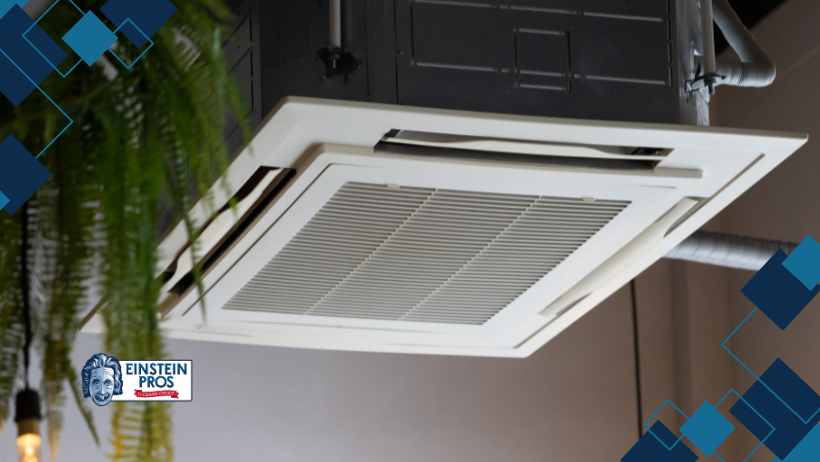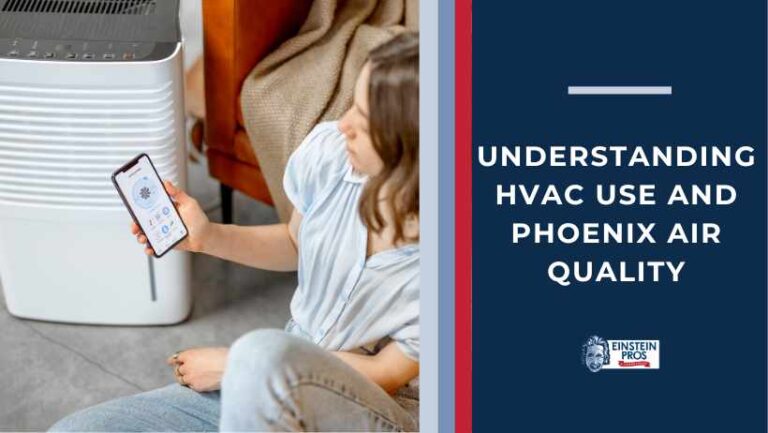With its scorching temperatures and arid climate, places in Phoenix, Arizona have unique demands on HVAC systems. In this blog post, we delve into the vital role that Phoenix air quality plays in HVAC use. From the challenges posed by the desert environment to practical solutions and tips for residents, this guide covers essential factors to consider for maintaining optimal indoor air quality.
The Phoenix Climate and Its Impact on Air Quality
High Temperatures and Airborne Particles
- Phoenix’s extreme heat contributes to the production of airborne particles, dust, and pollutants.
- Increased use of air conditioning can affect indoor air quality, as closed environments may trap pollutants.
Low Humidity and Indoor Air Quality
- The low humidity in Phoenix can lead to dry indoor air, potentially causing discomfort and respiratory issues.
- Explore how HVAC systems can help maintain an optimal balance of humidity for improved indoor Phoenix air quality.
Types of HVAC and Their Relationship to Phoenix Air Quality
In Phoenix, where the arid climate and outdoor dust can pose challenges to indoor air quality, different types of HVAC systems play a crucial role in improving and maintaining a healthy living environment. Each system has specific features that contribute to addressing the unique air quality concerns in the region.
1. Central Air Conditioning Systems
Central air conditioning systems are common in Phoenix and are effective in managing indoor temperature and humidity, thus influencing air quality positively.
- Temperature Control: By efficiently cooling the indoor space, central AC systems discourage the growth of mold and mildew, common concerns in humid conditions.
- Humidity Regulation: Central AC units often include dehumidification features, ensuring that indoor humidity levels remain within the optimal range, preventing the proliferation of dust mites and mold.
2. Ductless Mini-Split Systems
Ductless mini-split systems are gaining popularity in Phoenix due to their energy efficiency and flexibility in cooling individual rooms or zones.
- Zonal Cooling: By allowing homeowners to cool specific areas, ductless AC installation minimizes the need for extensive ductwork, reducing the chances of dust and contaminants accumulating in ducts.
- Air Filtration: Many ductless systems come equipped with advanced filtration options, such as multi-stage filters, which trap and remove particles, allergens, and pollutants from the air.
3. Evaporative (Swamp) Coolers
Swamp coolers are an alternative to traditional air conditioning systems in the dry Phoenix climate, using water to cool and humidify the air.
- Natural Humidification: Swamp coolers add moisture to the air, addressing the low humidity issues common in the region. This can prevent respiratory discomfort associated with excessively dry air.
- Cost-Effective Operation: As an energy-efficient option, swamp coolers are environmentally friendly and contribute to better air quality by avoiding the use of refrigerants.
4. Heat Pump Systems
Heat pump systems, which can both heat and cool indoor spaces, contribute to improved air quality in several ways.
- Air Filtration: Like many HVAC systems, heat pumps are equipped with filters that capture and remove airborne particles, allergens, and pollutants, promoting cleaner indoor air.
- Continuous Ventilation: Heat pumps provide continuous ventilation, exchanging indoor air with fresh outdoor air, and reducing the concentration of indoor pollutants.
5. HEPA Filtration Systems
For homeowners looking to enhance air quality further, standalone HEPA filtration systems can be integrated with existing HVAC systems.
- High-Efficiency Particle Capture: HEPA filters are designed to capture particles as small as 0.3 microns, including dust, pollen, and pet dander, providing superior air purification.
- Allergen Removal: HEPA filtration is particularly effective in removing allergens, making it an excellent choice for households with allergy or asthma sufferers.
6. UV-C Light Systems
UV-C light systems are becoming popular additions to HVAC systems in Phoenix for their ability to disinfect and purify the air.
- Microbial Elimination: UV-C light neutralizes airborne pathogens, bacteria, and viruses, reducing the risk of respiratory infections and allergies.
- Mold Prevention: By preventing mold growth in the HVAC system, UV-C light contributes to maintaining clean air and preventing the spread of mold spores.
How to Improve Air Quality
Improving air quality using HVAC (Heating, Ventilation, and Air Conditioning) units involves implementing various strategies and technologies to reduce indoor pollutants, enhance ventilation, and maintain a healthy indoor environment. Here are effective methods to achieve this:
1. Advanced Air Filtration Systems
High-Efficiency Particulate Air (HEPA) Filters
- Install HEPA filters in HVAC systems to capture small particles, including dust, pollen, mold spores, and pet dander.
- Highlight the ability of HEPA filters to improve air quality by trapping particles as small as 0.3 microns.
Activated Carbon Filters
- Incorporate activated carbon filters to adsorb gases, odors, and volatile organic compounds (VOCs).
- Explain how activated carbon enhances air quality by removing a wide range of chemical pollutants.
2. UV-C Light Air Purification
UV-C Light Installation
- Integrate UV-C light technology into HVAC systems to kill or deactivate airborne pathogens like bacteria and viruses.
- Emphasize the role of UV-C light in preventing mold growth and improving indoor air quality.
3. Regular HVAC Maintenance
Air Duct Cleaning
- Schedule periodic air duct cleaning as part of a professional HVAC service in Phoenix to remove accumulated dust, mold, and debris that can affect air quality.
- Discuss how clean ducts contribute to better airflow and reduce the circulation of pollutants.
Filter Replacement
- Stress the importance of regular filter replacement to ensure optimal efficiency and prevent the buildup of contaminants.
- Encourage homeowners to follow manufacturer recommendations for filter replacement intervals.
4. Humidity Control
Whole-House Humidifiers
- Install whole-house humidifiers to maintain optimal humidity levels, especially in dry climates like Phoenix.
- Discuss how proper humidity control prevents the proliferation of mold and improves respiratory comfort.

5. Ventilation Strategies
Increased Ventilation Rates
- Adjust HVAC systems to increase ventilation rates, allowing for the introduction of fresh outdoor air.
- Explain the importance of sufficient ventilation in diluting indoor pollutants and promoting a healthier environment.
Energy Recovery Ventilators (ERVs)
- Consider the installation of ERVs by HVAC pros as part of a complete HVAC service to enhance ventilation while minimizing energy loss.
- Discuss how ERVs exchange stale indoor air with fresh outdoor air, recovering heat or coolness in the process.
6. Smart Thermostats and Air Quality Monitoring
Smart Thermostat Integration
- Integrate smart thermostats that allow for precise control over HVAC settings based on indoor air quality.
- Discuss the ability of smart thermostats to optimize HVAC performance for both comfort and air quality.
Real-Time Air Quality Monitoring
- Employ air quality monitoring systems that provide real-time data on indoor air conditions.
- Empower homeowners to make informed decisions and adjustments based on live air quality information.
7. Eco-Friendly Refrigerants
Transition to Sustainable Refrigerants
- Consider using environmentally friendly refrigerants in HVAC systems to minimize the ecological impact.
- Discuss the benefits of sustainable refrigerants in reducing the carbon footprint of air conditioning units.
Implementing these methods collectively enhances the performance of HVAC systems in improving indoor air quality. Combining advanced filtration, UV-C light technology, regular maintenance, humidity control, effective ventilation, and smart technologies creates a holistic approach to creating a healthier and more comfortable indoor environment.
HVAC Brands That Can Improve Air Quality
Several HVAC brands offer advanced air filtration systems as part of their units, contributing to improved indoor air quality. Here are some reputable HVAC brands known for their emphasis on air filtration:
1. Lennox
Lennox is recognized for its high-efficiency HVAC systems and a commitment to indoor Phoenix air quality. Many Lennox systems come equipped with advanced filtration options, including HEPA filters and UV-C light technology, and HVAC technicians are ready to install one if needed.
2. Carrier
Carrier is a well-established HVAC brand that offers a range of systems designed to enhance indoor air quality. Their Infinity series, for example, includes air purifiers and advanced filtration to capture airborne particles.
3. Trane
Trane is known for its innovative heating, cooling, and air quality solutions. Trane’s CleanEffects™ air cleaner is designed to remove particles as small as 0.1 microns, providing comprehensive air purification.
4. Honeywell
While not exclusively an HVAC manufacturer, Honeywell produces a variety of air purifiers and filtration systems that can be integrated with HVAC systems. They are known for their electronic air cleaners and HEPA filters.
5. Aprilaire
Aprilaire specializes in indoor air quality solutions, and their HVAC products often include air purifiers and media filters. They focus on reducing allergens, pollutants, and contaminants in the air.
6. Ruud
Ruud, a part of the Rheem family, offers HVAC systems with a focus on energy efficiency and air quality. Their systems often feature advanced filtration options, such as MERV filters, which can be installed by skilled and licensed HVAC technicians.
7. American Standard
American Standard HVAC systems are designed with a focus on both comfort and air quality. Their AccuClean™ technology is known for the efficient removal of airborne particles.
8. Bryant
Bryant HVAC systems come equipped with various air quality features. The Evolution® series, for instance, includes air purifiers and filters designed to capture and kill airborne pathogens.
9. York
York provides HVAC systems with an emphasis on reliability and efficiency. Some of their units incorporate air purifiers and filters to enhance indoor air quality.
10. Amana
Amana, known for its reliable and affordable HVAC systems, offers units with advanced air filtration options. Their air purifiers and filters contribute to a healthier indoor environment.
Conclusion
In conclusion, the connection between air quality and HVAC systems in Phoenix is multifaceted and crucial for the well-being of residents. By understanding the challenges posed by the desert climate and adopting appropriate HVAC solutions, individuals can create healthier indoor environments while contributing to energy efficiency and sustainability.
Implementing regular maintenance practices from trusted HVAC pros like Einstein Pros, investing in energy-efficient technologies, and staying informed about the latest innovations are essential steps toward ensuring optimal indoor air quality in Phoenix
